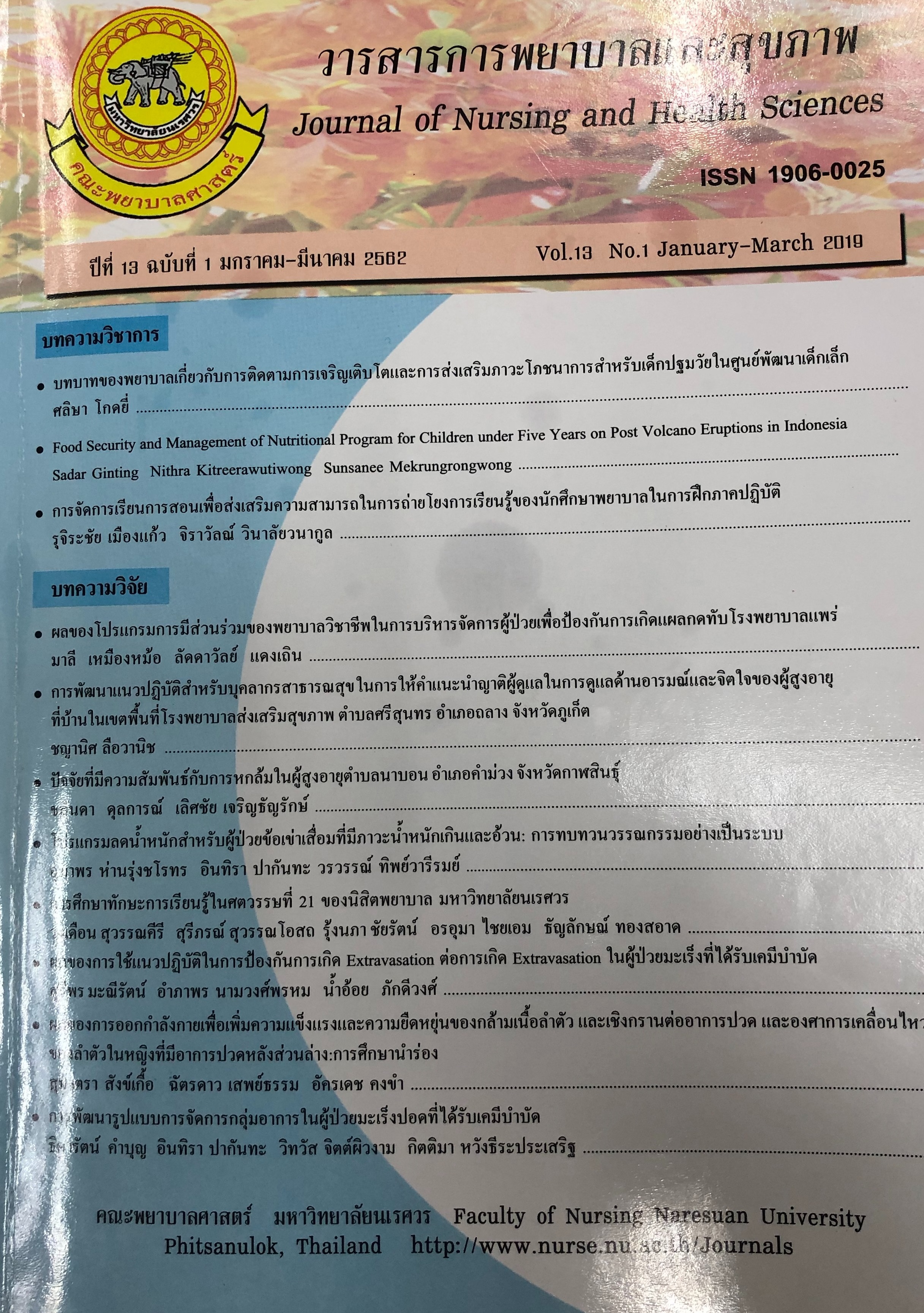Exploring 21stCentury Learning Skills of Nursing Students, Naresuan University
Main Article Content
Abstract
The aim of this descriptive research study was to examine and compare the 21st Century learning skills of undergraduate nursing students. The study sample was composed of 445 nursing students in all year levels in the academic year 2017. The research instruments consist of two parts: the demographic data questionnaire and Turner et.al.'s (2015) 21st century skills of nursing student questionnaire. The Cronbach's Alpha reliability Coefficient of the 21st century skills of nursing student questionnaire was 0.97. Both descriptive statistics and One-way ANOVA were performed for the data analysis. The research findings were: 1. Nursing students in all year levels reported the good level of the 21st century skills ( = 3.84, SD = .38). The highest mean score was Computing and Information Communication Technology skills ( = 4.31, SD = .56), and the lowest mean score was reading, writing, and arithmetic ( = 3.47, SD = .45). 2. Nursing students in each year level reported the good level of the 21st century skills ( = 3.75-3.99, SD = .35-.39). The 4th year of nursing students reported the highest mean score of the 21st century skills ( = 3.99, SD = .39) and their score was statistically different from those of the 2nd year level ( = 3.75, SD = .36), p < .001 and the 3rd year level ( = 3.79, SD = .39), p < .01. These research results indicated that undergraduate nursing students in Naresuan University had good level of the 21st century skills. The teaching methods should be developed and resources should be facilitated in order to enhance nursing students' 21st century skills especially those skills with low level of the mean scores.
Article Details
References
Borglin, G., & Fagerstrom, C. (2012). Nursing students'
understanding of critical thinking and appraisal
and academic writing: A descriptive, qualitative
study. Nurse Education in Practice, 12(6):
-360.
Chantra, R., &Sarakshetrin, A. (2017). Learning skills in
stcenturyof nursing students at Boromarajonani
College of Nursing, Suratthani. The Southern
College Network Journal of Nursing and Public
Health.4(1): 180-190. [In Thai]
Daengthern, L. (2014). Factor influencing stress among
nursing students of faculty of nursing during
clinical practice. The Journal of Macro Trends in
Health and Medicine, 2(1): 61-71.
Faculty of Nursing, Naresuan University. (2011).
Bachelor of Nursing Science Program (Revised
in 2011). Phitsanulok: Faculty of Nursing,
Naresuan University. [In Thai]
Faculty of Nursing, Naresuan University. (2016).
Bachelor of Nursing Science Program (Revised
in 2016). Phitsanulok: Faculty of Nursing,
Naresuan University. [In Thai]
Gray, R., Pataravanich, U., Lucktong, A., & Sangkla,
J. (2016). Quality of life among employed
population by generations. NakhonPathom:
Institute for Population and Social Research,
Mahidol University. [In Thai]
Ministry of Education. (2009). Undergraduate Thailand
qualification framework (TQF) for nursing
science, 2009. Bangkok: Ministry of Education.
[In Thai]
Mohr, K. A. J., & Mohr, E. S. (2016). Understanding
generationz students to promote a contemporary
learning environment. Journal on Empowering
Teaching Excellence, 1(1), 84-94.
Office of the Higher Education Commission. (2015).
Education quality assurance guide for higher
education, 2014. Nonthaburi: Parbpim Limited
Partnership. [In Thai]
Panich, V. (2016). Creating learning in the 21st century.
Bangkok: Siam Commercial Foundation. [In Thai]
Panich, V. (2012). The way to createlearning in the 21st
century. Bangkok: Sodsrisaritwong Foundation.
[In Thai]
Partnership for 21st Century skills. (2009). P21 Framework
definitions. Retrieved 6 April 2018 from
http://www.p21.org/storage/documents/P21_
Framework_ Definitions.pdf
Partnership for 21st Century skills. (2007). P21 Framework
for 21st century learning. Retrieved 6 April
from http://www.p21.org/our-work/p21-
framework.
Saminpanya, P., &Toomsan, A. (2016). Twenty first
century skills of nursing students of Mission
Faculty of Nursing, Asia-Pacific International
University. Retrieved 14 March 2018
from http://isc2017.apiu.edu/conferencepapers/
aiu/Saminpanya%20&
%20Toomsan.Nursing.skills. AIU.students.pdf
[In Thai]
Thai Health Promotion Foundation. (2014). Society
generations, they are different but can be
combined. Retrieved 14 March 2018 from http://
www.thaihealth.or.th/Content/24492-"Social
%204% Generation" %20Differt but can be
combined.html[In Thai]
The Center for Generational Kenetics and Jason
Dorsey. (2016). iGen (Gen Z) tech disruption.
Retrieved 6 April 2018 from https://genhq. com/
wp-content/uploads/2016/01/iGen-Gen-Z-Tech-
Disruption-Research-White-Paper-c-2016-
Center-for-Generational-Kinetics.pdf
Trakanchan, N. (2016). 21st century skills of nursing
students Ratchatani University in 2016.The 1st
National Conference of Ratchatani University.
-1737. Retrieved 14 March 2018 from http:/
/jes.rtu.ac.th/rtunc2016/pdf/Poster% 20Presentation/
Poster %...E/HS_31.pdf[In Thai]
Turner, K.,Leungratanamart, L., Niranrat, S., Janarerux,
J., Wattanakull, B., & Reunreang, T. (2015).
Twenty first century skills of nursing students
of Boromarajonani College of Nursing, Chonbiri.
Nursing Journal of the Ministry of Public
Health, 25(2), 179-193. [In Thai]
Yamane, T. (1973). Statistics: An introduction analysis
(2nd ed.). New York: Harper & Row.


